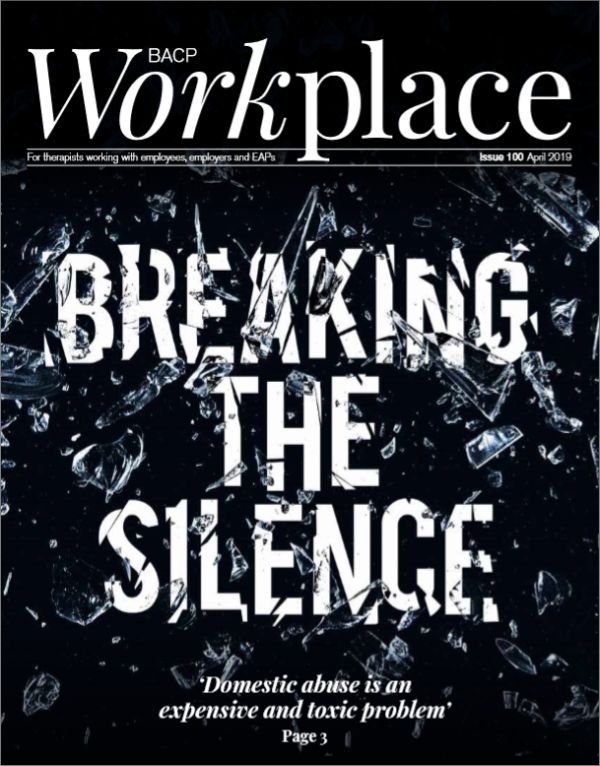In this issue
Features
Breaking the silence (free article)
Nicola Jagielski explores how workplaces can support employees experiencing domestic abuse and highlights the role that therapists can play.
A hidden epidemic
When supporting victims of domestic abuse, employers and workplace counsellors need to understand the different experiences of those coming from LGBT and BAME communities. Tom Rowland explains why.
Focus on … Facing the future
Nicola Banning talks to Kris Ambler, BACP’s new Workforce Lead about how he plans to bring our expertise to the attention of Government, employers and stakeholders.
When NLP comes to work
Yasuhiro Kotera makes the case for counsellors to introduce neuro-linguistic programming into their skillset when working with employees.
Better conversations about … New parents and emotional wellbeing
Jane Moffett explores the role that employers can play in supporting staff as they embark on the parenthood journey
Regulars
Notes from the Chair
Nicola Neath - New beginnings
Columns
Ageing matters (free article)
Jeremy Bacon - Who cares for the carer?
Cyberwork
Sarah Worley-James - Self-care working online
Talking purple (free article)
David Caldwell - Growing confidence
Workplace matters
Sandi Mann - When a work colleague takes their life

Divisional members and subscribers can download the pdf from the BACP Workplace archive.
Editorial - Picking up the pieces
Nearly 20 years ago, I made a film about a young mother of three who had been murdered by her husband after years of domestic abuse.
My role was to interview her grief-stricken mother in her kitchen. I can still remember the taste in my mouth. It was a tipping point in my mental health, leading me to access counselling through my workplace. I didn’t understand vicarious trauma until years later, but I knew I’d sustained some kind of injury. It’s not uncommon either for those who work with the human experience but without the appropriate professional support, care and supervision.
This issue, Nicola Jagielski’s article, Breaking the silence , puts the spotlight on domestic abuse and the role of employers in supporting their employees. Estimated to cost business £1.9 billion a year, domestic abuse is an expensive and toxic problem. It’s complex too, even for experienced practitioners, requiring high levels of emotional intelligence on the part of concerned managers or colleagues. So, the focus is on ‘prevention activities’, managing difficult conversations and creating a culture where it’s safe to disclose abuse.
Recent research suggests that disclosures at work are low. It’s left me reflecting on what’s happening to people in their work as more is expected of employers, to pick up the pieces of our collapsing social and welfare infrastructure. Whether it’s headteachers providing food parcels to hungry children or cleaning the school loos, or managers elsewhere supporting employees who are experiencing abuse, there is a cost to every single employee who is stepping in and bearing the burden.
Last month at the national Health and Wellbeing at Work conference, it was clear that employers are understanding more about how occupational hazards – both physical and psychological – can impact on the mental health of their workforce. But there are glaring gaps too.
Just think about the growing culture of mental health volunteering – of workplace champions, mental health first aiders – and ask, who’s looking after their mental health? When an employee steps into a role without adequate training or support, there’s an opportunity for our profession. Therapists can work with business to provide a layer of professional emotional and psychological support that is otherwise all too often worryingly absent.
Nicola Banning
Editor, BACP Workplace
workplaceeditor@bacp.co.uk
